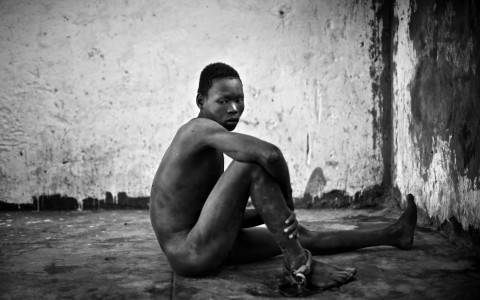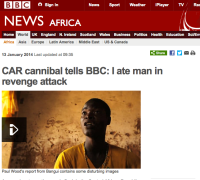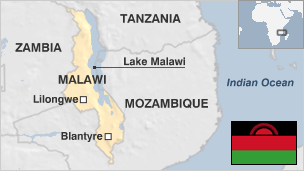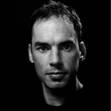Dowden slams Daily Mail for coverage of war trauma in Africa
by - 12th February 2014

DIRECTOR of the Royal African Society Richard Dowden this week criticised the Daily Mail’s ‘dehumanizing’ coverage of violent suffering in Central African Republic.
 The Mail story, ‘Mad Dog the Cannibal’, which was lifted from an eye-witness account by the BBC, gave no explanation as to what caused a man to 'eat' the flesh of his assailant.
The Mail story, ‘Mad Dog the Cannibal’, which was lifted from an eye-witness account by the BBC, gave no explanation as to what caused a man to 'eat' the flesh of his assailant.
The horrendous reprisal attack on a Séléka [‘coalition rebel’] Muslim by a deranged ‘Christian’ was witnessed by BBC World Affairs Correspondent Paul Wood, who wrote: ‘It might have been the result of his own demons, not a symptom of a religious conflict.’
Yet the man had just witnessed Seleka militia killing his pregnant wife, his sister-in-law and her baby.
Astonishingly, the connection with trauma was not made by Wood or in the Mail gloss of his story.
 Dowden, a former Africa Editor for the Economist described the report as 'dehumanizing'.
Dowden, a former Africa Editor for the Economist described the report as 'dehumanizing'.
‘The immediate reaction is they’re all savages, primitive people' he told Lapido.
‘Yet in Africa there’s a very strong belief in the spirit world. It’s a reality and it has been in European history as well. Don’t think this is some primitive madness; it has a logic to it.
‘If you kill someone by eating them their spirit enters you and the spirit won’t attack itself. It’s about the spirit world.’
Award-winning photojournalist Robin Hammond began documenting the lives of trauma victims in Africa three years ago, moved by the plight of a girl left by the side of the road in Southern Sudan.
To his horror he found when covering South Sudan’s independence for the Sunday Times, that war trauma victims were simply abandoned or even gaoled.
Healers
Many with mental health problems turned to ‘highly respected religious healers’ who were ‘the only source of healing’, he told Lapido. Western medicine was rare.
‘Western medicine simply doesn't exist, is too expensive, is too hard to access, or there are not the skilled health professionals to diagnose illness and prescribe medicines.’
 Recent reports from Malawi – with just one state-funded mental health facility for a population of 16million - show patients caught between neglect and social ignorance.
Recent reports from Malawi – with just one state-funded mental health facility for a population of 16million - show patients caught between neglect and social ignorance.
Harry Kawiy - psychiatric clinical officer at Zomba Mental Hospital in Malawi - complained about being ‘neglected and forgotten’ by the government.
‘Zomba should be a top priority because most of the social ills in the country would be prevented if mental health was proficiently managed.’
Dualism
 British researcher Jerome Wright at the University of York is working to integrate mental health care into primary care in a ‘culturally attuned’ way in Malawi.
British researcher Jerome Wright at the University of York is working to integrate mental health care into primary care in a ‘culturally attuned’ way in Malawi.
He says patients are comfortable with a dual biomedical and spiritual approach to managing symptoms. Holding to an explanation of bewitchment was normal, he added.
‘The West needs to understand the issues from a Malawian perspective and avoid cultural imperialism.’
He praised some traditional healers for ‘excellent’ counselling which could help people with ‘psycho-social problems’. This offered an explanatory model for mental difficulties which did not sever the community aspect of emotional pain – something missing in the West.
Wright’s words follow a report published in the British Medical Council Public Health Journal last year that found a ‘marked discrepancy’ in explanatory models of mental illness between Africa and other parts of the world.
Punishment
A report funded by the Scotland Malawi Mental Health Education Project found 21.9% of those surveyed in Malawi ‘attributed mental illness to God’s punishment’.
The report also noted, ‘While in Western traditions, the mind and body are traditionally considered as distinct entities, this may not be true in Malawi. It is possible that spiritual possession is believed to influence the brain directly’.
Only 1.5% of Malawi’s public health budget is spent on mental health, according to the Tropical Health and Education Trust (THET) – compared with 11 per cent in UK.
THET was set up to stop the brain drain from the poorest nations by encouraging NHS staff to give their time through unpaid leave to run training and facilitation in the poorest countries.
In 2006, their research revealed that there were more Malawian psychiatrically-trained staff working in Britain than in Malawi – which has just one psychiatrist.
Silence
Malawian pastor and journalist Edward Mikwamba wants more work done to improve awareness and treatment.
‘Africans think that people with schizophrenia or depression have demons. Or that it’s a disease caused by someone using charms on them.
‘It’s time for a multi-sectoral approach to fight mental illness – including investment, care, prayer and information.’

Robin Hammond's moving photography can be found at www.robinhammond.co.uk or via Panos.
